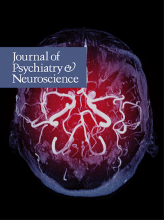Research Paper
Knockdown of the schizophrenia susceptibility gene TCF4 alters gene expression and proliferation of progenitor cells from the developing human neocortex
Matthew J. Hill, Richard Killick, Katherinne Navarrete, Aleksandra Maruszak, Gemma M. McLaughlin, Brenda P. Williams and Nicholas J. Bray
J Psychiatry Neurosci May 01, 2017 42 (3) 181-188; DOI: https://doi.org/10.1503/jpn.160073
Matthew J. Hill
From the Department of Basic and Clinical Neuroscience, King’s College London, London, UK (Hill, Killick, Maruszak, McLaughlin, Williams, Bray); the MRC Social, Genetic and Developmental Psychiatry Centre, Institute of Psychiatry, Psychology and Neuroscience, King’s College London, London, UK (Navarrete); Neuroscience and Mental Health Research Institute, Cardiff University, Cardiff, UK (Hill); and the MRC Centre for Neuropsychiatric Genetics & Genomics, Division of Psychological Medicine and Clinical Neurosciences, Cardiff University School of Medicine, Cardiff, UK (Bray)
PhDRichard Killick
From the Department of Basic and Clinical Neuroscience, King’s College London, London, UK (Hill, Killick, Maruszak, McLaughlin, Williams, Bray); the MRC Social, Genetic and Developmental Psychiatry Centre, Institute of Psychiatry, Psychology and Neuroscience, King’s College London, London, UK (Navarrete); Neuroscience and Mental Health Research Institute, Cardiff University, Cardiff, UK (Hill); and the MRC Centre for Neuropsychiatric Genetics & Genomics, Division of Psychological Medicine and Clinical Neurosciences, Cardiff University School of Medicine, Cardiff, UK (Bray)
PhDKatherinne Navarrete
From the Department of Basic and Clinical Neuroscience, King’s College London, London, UK (Hill, Killick, Maruszak, McLaughlin, Williams, Bray); the MRC Social, Genetic and Developmental Psychiatry Centre, Institute of Psychiatry, Psychology and Neuroscience, King’s College London, London, UK (Navarrete); Neuroscience and Mental Health Research Institute, Cardiff University, Cardiff, UK (Hill); and the MRC Centre for Neuropsychiatric Genetics & Genomics, Division of Psychological Medicine and Clinical Neurosciences, Cardiff University School of Medicine, Cardiff, UK (Bray)
PhDAleksandra Maruszak
From the Department of Basic and Clinical Neuroscience, King’s College London, London, UK (Hill, Killick, Maruszak, McLaughlin, Williams, Bray); the MRC Social, Genetic and Developmental Psychiatry Centre, Institute of Psychiatry, Psychology and Neuroscience, King’s College London, London, UK (Navarrete); Neuroscience and Mental Health Research Institute, Cardiff University, Cardiff, UK (Hill); and the MRC Centre for Neuropsychiatric Genetics & Genomics, Division of Psychological Medicine and Clinical Neurosciences, Cardiff University School of Medicine, Cardiff, UK (Bray)
PhDGemma M. McLaughlin
From the Department of Basic and Clinical Neuroscience, King’s College London, London, UK (Hill, Killick, Maruszak, McLaughlin, Williams, Bray); the MRC Social, Genetic and Developmental Psychiatry Centre, Institute of Psychiatry, Psychology and Neuroscience, King’s College London, London, UK (Navarrete); Neuroscience and Mental Health Research Institute, Cardiff University, Cardiff, UK (Hill); and the MRC Centre for Neuropsychiatric Genetics & Genomics, Division of Psychological Medicine and Clinical Neurosciences, Cardiff University School of Medicine, Cardiff, UK (Bray)
MScBrenda P. Williams
From the Department of Basic and Clinical Neuroscience, King’s College London, London, UK (Hill, Killick, Maruszak, McLaughlin, Williams, Bray); the MRC Social, Genetic and Developmental Psychiatry Centre, Institute of Psychiatry, Psychology and Neuroscience, King’s College London, London, UK (Navarrete); Neuroscience and Mental Health Research Institute, Cardiff University, Cardiff, UK (Hill); and the MRC Centre for Neuropsychiatric Genetics & Genomics, Division of Psychological Medicine and Clinical Neurosciences, Cardiff University School of Medicine, Cardiff, UK (Bray)
PhDNicholas J. Bray
From the Department of Basic and Clinical Neuroscience, King’s College London, London, UK (Hill, Killick, Maruszak, McLaughlin, Williams, Bray); the MRC Social, Genetic and Developmental Psychiatry Centre, Institute of Psychiatry, Psychology and Neuroscience, King’s College London, London, UK (Navarrete); Neuroscience and Mental Health Research Institute, Cardiff University, Cardiff, UK (Hill); and the MRC Centre for Neuropsychiatric Genetics & Genomics, Division of Psychological Medicine and Clinical Neurosciences, Cardiff University School of Medicine, Cardiff, UK (Bray)
PhD
Data supplements
Online Appendices
Files in this Data Supplement:
Related Articles
In this issue
Article tools
Respond to this article
Knockdown of the schizophrenia susceptibility gene TCF4 alters gene expression and proliferation of progenitor cells from the developing human neocortex
Matthew J. Hill, Richard Killick, Katherinne Navarrete, Aleksandra Maruszak, Gemma M. McLaughlin, Brenda P. Williams, Nicholas J. Bray
J Psychiatry Neurosci May 2017, 42 (3) 181-188; DOI: 10.1503/jpn.160073
Knockdown of the schizophrenia susceptibility gene TCF4 alters gene expression and proliferation of progenitor cells from the developing human neocortex
Matthew J. Hill, Richard Killick, Katherinne Navarrete, Aleksandra Maruszak, Gemma M. McLaughlin, Brenda P. Williams, Nicholas J. Bray
J Psychiatry Neurosci May 2017, 42 (3) 181-188; DOI: 10.1503/jpn.160073
Related Articles
Cited By...
- Decoding the porcine developing spatial processing system and production of human entorhinal stellate cell-like cells by a direct programming approach
- Daughterless, the Drosophila orthologue of TCF4, is required for associative learning and maintenance of the synaptic proteome
- Building a schizophrenia genetic network: Transcription Factor 4 regulates genes involved in neuronal development and schizophrenia risk
- The Intellectual Disability and Schizophrenia Associated Transcription Factor TCF4 Is Regulated by Neuronal Activity and Protein Kinase A








